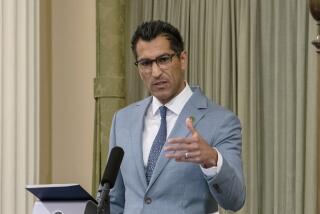In Indiana, it’s war on property tax
indianapolis -- With property values in Indiana being reassessed for the first time in six years, Laura Hile said she expected that the tax bill for her modest three-bedroom home would be big.
After all, state officials had warned residents to expect an increase of as much as 24%.
But when the bill arrived this summer, Hile’s annual taxes were almost 200% higher than before -- an extra $3,000 a year.
It’s more than she can afford to pay.
“I can’t afford to keep my house,” said Hile, 48, a medical writer for pharmaceutical firm Eli Lilly & Co. “I feel very stuck, and I’m very afraid. For the first time in my life, I’m thinking about just walking away from everything.”
She’s not alone.
Indiana homeowners are waging war against a system they see as inconsistent and unfair. Many politicians agree with their view. Property tax revenue traditionally helps fund local governments, which set the amounts and help distribute the money to local entities that provide services.
In Indiana, state officials said, there are about 1,000 local township assessors. These elected officials are responsible for, among other tasks, evaluating a property’s worth and sending that information on to the state’s 92 county assessors, who use the assessments to help set the property tax bills.
State law requires that assessments be based partly on a property’s market value, how much it could be sold for. But not all assessors follow state guidelines on how local tax assessments should be conducted -- or are even formally trained to do the job in the first place, said Gov. Mitch Daniels.
“As a result, the process can be unfair,” Daniels said in a recent interview. “The local assessments are in some cases outright botched.”
The public outcry has grown so loud that a commission has been established -- headed by Indiana Supreme Court Chief Justice Randall T. Shepard and former Gov. Joseph E. Kernan -- to seek ways to fix the problem.
Rising property taxes have long been an issue nationwide, particularly in regions where property values have increased dramatically. In Indiana, some lawmakers say they are looking at putting a cap on property tax rates, and examining the model of California’s controversial Proposition 13.
Others have suggested the state should abolish property tax altogether. And at least one state legislator is pushing for Indiana to start taxing property owned by charities, including church-run hospitals, private schools and universities.
“I don’t want to tax the land underneath a church itself. But what about the hundreds of acres beneath a shopping center or hospital that brings in millions of dollars that a church owns?” said state Rep. Tom Saunders, a Republican who worked as a county and township assessor in Indiana for 20 years. “I’m not evil. I’m just trying to figure out a solution for a system that for decades simply hasn’t worked.”
In Marion County, which encompasses Indianapolis, residents have responded to the tax-bill jump with rallies outside the governor’s residence and with mock for-sale signs on their lawns that cite “unfair taxation.” Some of the protest signs have included the home phone numbers for Daniels and Indianapolis Mayor Bart Peterson.
A group calling itself Hoosiers for Fair Taxation has been rallying residents to protest the increase by bringing their tax bills to demonstrations. The protesters pack the paperwork into giant “tea bags” and dunk them into lakes in symbolic defiance.
“No one understands how the government’s figured out how much their property is worth, or why their tax bill is so high. Especially when a neighbor across the street, with the exact same floor plan, has a bill that’s half the price,” said Melyssa Donaghy of Indianapolis, an activist against property taxes.
But it’s not so much the size of the bills that has sparked the public backlash, said D. Eric Schansberg, a professor of economics at Indiana University Southeast in New Albany.
“It’s the unpredictability -- of what the assessments are, of what the tax bill’s going to be, of how the system even works in the first place -- that gets to people,” said Schansberg, who tracks economic issues in the state.
The debate dates back to 1973, said Schansberg, when lawmakers tried to solve a similar dispute. They sought to shift the burden from property owners by increasing the state sales tax and letting local governments charge income tax.
Trouble with the system continued. In 1998, the state Supreme Court found that Indiana’s property assessment rules were unconstitutional. Back then, assessments were based partly on how much it would cost to rebuild a property.
But neither change addressed some core problems. For one thing, Indiana has more than 2,700 local taxing authorities -- which feed into local government budgets that have been growing far faster than local incomes can support, said Daniels.
“Local spending has doubled while incomes have remained flat,” Daniels said. “That means taxes are going to go up unless something changes.”
And then there’s the fact that local township assessors are not required to have any formal training -- such as how to survey property or how to uniformly assess real estate.
As a result, residents say, they often get conflicting reasons as to why their property tax bills have gone up. (Homeowners can pursue complaints over tax bills first at the county level, and then move on to the state.)
Jeff Hays said he paid $113,000 in cash last summer for his cozy two-bedroom brick home, with its grove of maple trees and backyard edged with honeysuckle vines.
Housing prices in his neighborhood on Indianapolis’ north side have remained relatively flat for several years. But his tax bill this year is nearly 50% higher than in 2006. Infuriated, he tried to contact four different local assessors to figure out what happened.
“I got four different answers as to why it went up,” said Hays, 47, who owns a furniture restoration business. “I’m so frustrated I could scream.”
Saunders said he understood the feeling. When he stepped into the role of assessor in Franklin Township, about 50 miles east of Indianapolis, more than 30 years ago, he had little experience, he said.
“I took some courses, got some training to figure out how to do the job,” said Saunders, a former president of the Indiana County Assessors Assn. “But not everyone did.”
Daniels and other Indiana lawmakers are trying to address the situation, particularly for people like Hile and Hays who say they can’t afford the increase.
In some counties, officials are offering homeowners extensions or allowing a series of smaller payments.
Daniels said he had learned that some business properties in Marion County had gotten assessments that were undervalued. That, in turn, had unfairly boosted homeowners’ tax bills.
Last month, he ordered that residents in Marion County be allowed to pay their current tax bill at their 2006 rates, and demanded that all assessments be tossed out and redone.
He later ordered such do-overs in Gibson, Posey and Delaware counties.
And last week, he extended a deadline for local governments to decide whether to raise income tax rates.
“Right now, we’re just trying to help taxpayers in the short term, while we try to figure out a longer-term solution,” Daniels said.
--
More to Read
Sign up for Essential California
The most important California stories and recommendations in your inbox every morning.
You may occasionally receive promotional content from the Los Angeles Times.










